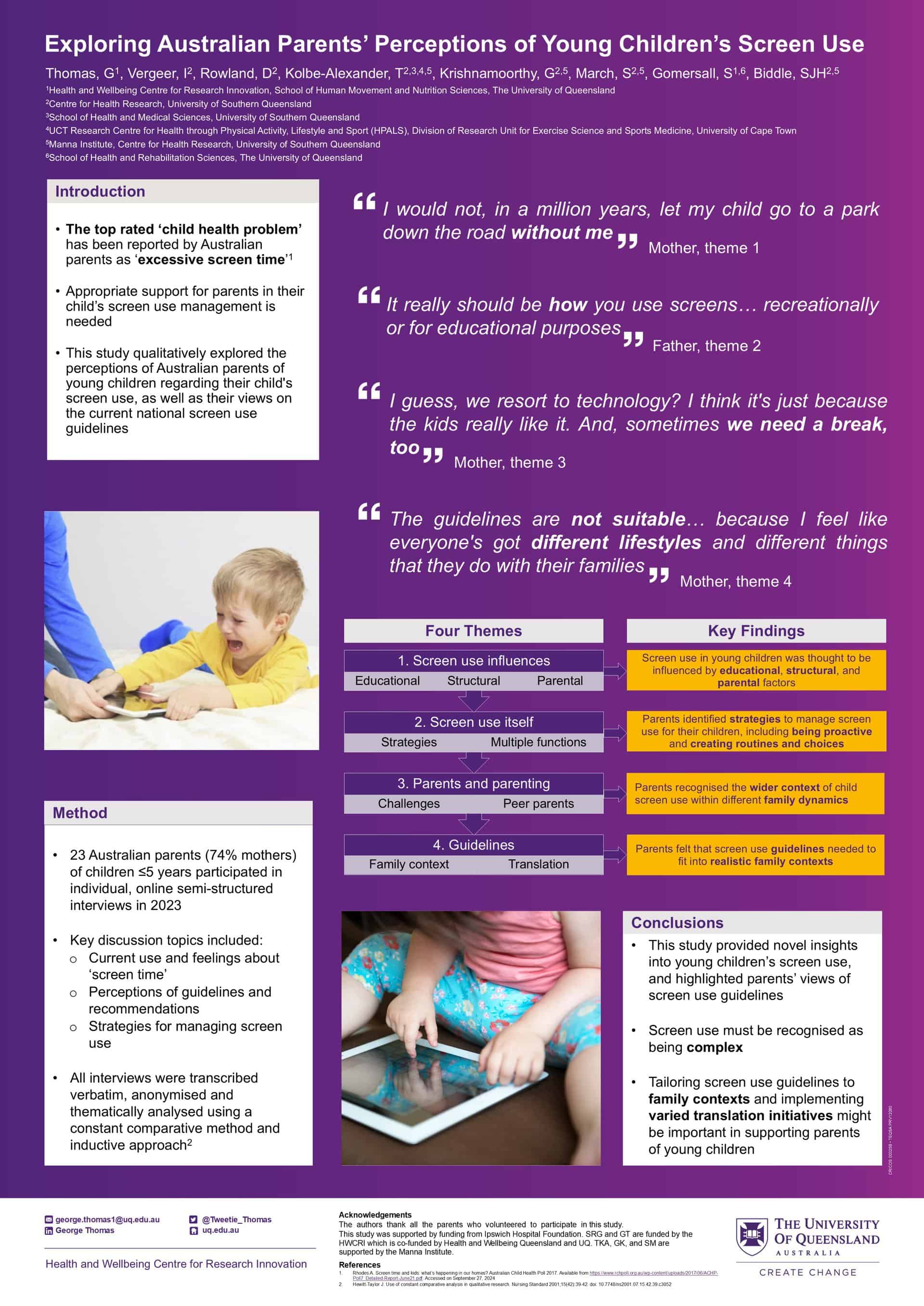
Exploring Australian Parents’ Perceptions of Young Children’s Screen Use
Abstract Overview
Background:
Excessive screen use is the main concern Australian parents have about the health and behaviours of their young children.
Purpose:
To explore the perceptions of Australian parents of pre-school children of their child’s use of screens, and their views of current national screen use guidelines.
Methods:
Parents from regional and urban areas in Queensland, Australia participated in semi-structured one-to-one interviews. Guide questions included perceptions of current use and feelings about ‘screen time’; current guidelines; and strategies for managing screen use. All interviews were transcribed verbatim and thematically analysed using an inductive approach.
Results:
Across 23 parents (17 mothers and 6 fathers) aged 27-53 years, screen use in young children was thought to be influenced by educational, structural, and parental factors. Parents identified strategies to manage screen use for their children, including being proactive, creating routines and choices, and setting rules and expectations. Multiple purposes of screens were identified, such as education, with some concerns raised in finding the balance alongside known risks of excessive use. Parents had mixed views regarding screen use guidelines and felt that guidelines needed to fit into realistic family contexts. Several recommendations were made pertaining to guidelines, such as improving translation through multiple pathways and adding suggestions for alternative activities.
Conclusions:
Screen use in young children was identified as source of concern and frustration for parents. Tailoring screen use guidelines to family contexts and implementing varied translation initiatives might be important in supporting parents of young children.
Practical Implications:
This work has been used to develop a survey which will inform intervention development, including co-design methods.
Funding:
This study was supported by funding from Ipswich Hospital Foundation. SRG and GT are funded by the HWCRI which is co-funded by Health and Wellbeing Queensland and UQ. TKA, GK, SM are supported by the Manna Institute.

Additional Authors
Name: Ineke Vergeer
Affiliation: Centre for Health Research, University of Southern Queensland, Springfield Central, Australia
Presenting Author: no
Name: Deborah Rowland
Affiliation: Centre for Health Research, University of Southern Queensland, Springfield Central, Australia
Presenting Author: no
Name: Tracy Kolbe-Alexander
Affiliation: Centre for Health Research, University of Southern Queensland, Springfield Central, Australia; School of Health and Medical Sciences, University of Southern Queensland, Australia; UCT Research Centre for Health through Physical Activity, Lifestyle and Sport (HPALS), Division of Research Unit for Exercise Science and Sports Medicine, University of Cape Town, South Africa; Manna Institute, Centre for Health Research, University of Southern Queensland, Australia
Presenting Author: no
Name: Govind Krishnamoorthy
Affiliation: Centre for Health Research, University of Southern Queensland, Springfield Central, Australia; Manna Institute, Centre for Health Research, University of Southern Queensland, Australia
Presenting Author: no
Name: Sonja March
Affiliation: Centre for Health Research, University of Southern Queensland, Springfield Central, Australia; Manna Institute, Centre for Health Research, University of Southern Queensland, Australia
Presenting Author: no
Name: Sjaan Gomersall
Affiliation: Health and Wellbeing Centre for Research Innovation (HWCRI), School of Human Movement and Nutrition Sciences, The University of Queensland (UQ), Australia
Presenting Author: no
Name: Stuart Biddle
Affiliation: Health and Wellbeing Centre for Research Innovation (HWCRI), School of Human Movement and Nutrition Sciences, The University of Queensland (UQ), Australia
Presenting Author: no

